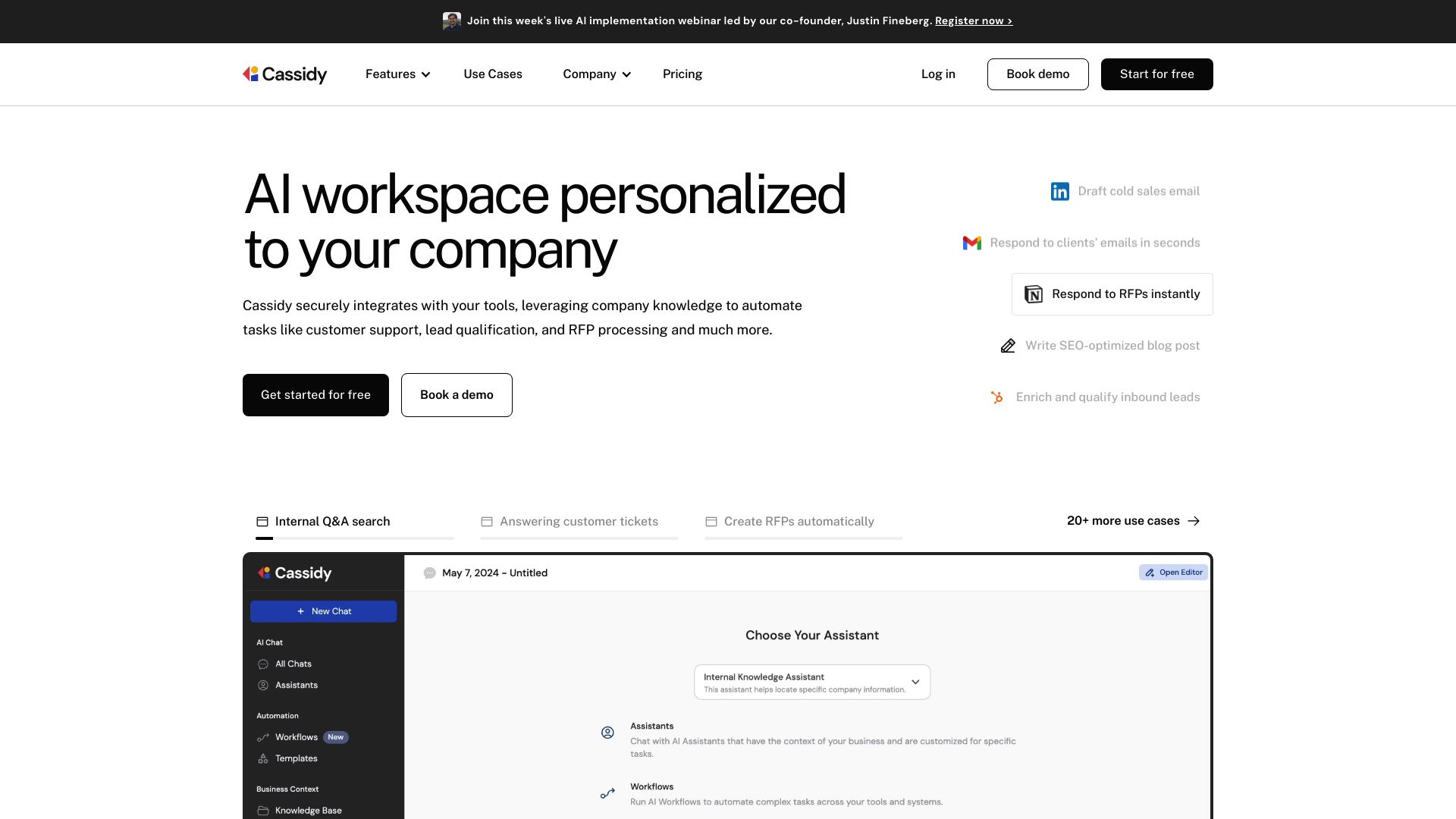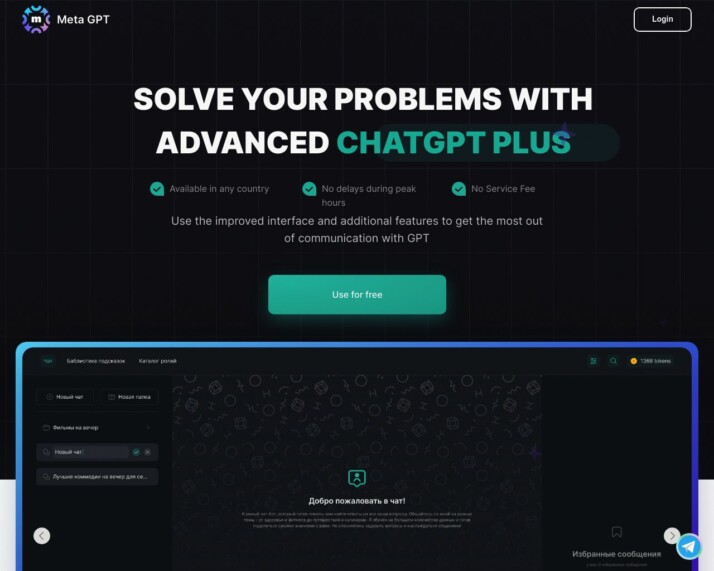Cassidy vs. MetaGPT: AI Agent Platforms Compared
AI agent platforms revolutionize business operations, offering powerful tools to automate tasks and enhance productivity. This review compares Cassidy vs. MetaGPT, and SmythOS, three leading solutions in the AI automation space. We examine each platform’s unique approach to AI agent development, assessing their strengths in customization, multi-agent collaboration, and integration capabilities.
By exploring key features, use cases, and overall utility, we aim to help developers, business leaders, and AI enthusiasts make informed decisions about which platform best suits their needs. Whether you’re looking to streamline workflows, tackle complex software projects, or harness AI for specific business applications, this comparison provides valuable insights into the capabilities and limitations of these innovative AI tools.
Cassidy Overview
Cassidy specializes in creating customized AI assistants and workflows tailored to specific business needs. The platform integrates seamlessly with existing tools, leveraging company knowledge to automate tasks across customer support, lead qualification, and RFP processing.


Cassidy’s no-code workflow builder empowers users to create complex AI automations through an intuitive drag-and-drop interface. This visual approach democratizes AI development, allowing non-technical team members to harness AI’s power for enhanced productivity.
Cassidy’s no-code workflow builder empowers users to create complex AI automations through an intuitive drag-and-drop interface.
The platform’s model-agnostic approach ensures flexibility, supporting various foundational AI models to future-proof AI strategies. Cassidy integrates with multiple data sources, including Google Drive, Slack, and Notion, expanding its utility across different business processes.
Security remains a top priority for Cassidy, with enterprise-grade measures safeguarding data confidentiality. The platform never uses client data for model training, addressing crucial privacy concerns in AI adoption.
While Cassidy offers robust features for AI assistant creation and workflow automation, it lacks some advanced capabilities. The platform doesn’t explicitly mention multimodal support, debug modes, or audit logs for detailed analytics. These limitations may impact users requiring more granular control or diverse input handling in their AI solutions.
MetaGPT Overview
MetaGPT revolutionizes multi-agent collaboration by merging human Standardized Operating Procedures (SOPs) with advanced Large Language Models (LLMs). Developed by researchers from prestigious institutions, MetaGPT simulates a software company’s structure to tackle complex software development tasks efficiently.


The platform assigns distinct roles to AI agents, mirroring a traditional software company’s hierarchy. This approach, encapsulated in the philosophy “Code = SOP(Team),” integrates established human practices into AI-driven processes. MetaGPT breaks down tasks into manageable subtasks, handled by specialized agents, ensuring more accurate and robust solutions.
MetaGPT revolutionizes multi-agent collaboration by merging human Standardized Operating Procedures (SOPs) with advanced Large Language Models (LLMs).
MetaGPT stands out by generating comprehensive documentation throughout the development process, including requirement documents, design artifacts, and interface specifications. This feature enhances the final code’s success rate and facilitates better human-AI interaction. The framework’s ability to reduce errors typically associated with multi-agent systems, such as cascading hallucinations or logic inconsistencies, sets it apart in the AI development landscape.
MetaGPT stands out by generating comprehensive documentation throughout the development process, including requirement documents, design artifacts, and interface specifications.
While MetaGPT offers powerful collaboration tools, it may present challenges for users seeking a more intuitive, no-code approach. The platform’s focus on replicating software company structures could be overwhelming for smaller teams or individual developers looking for simpler AI agent creation. Additionally, the learning curve associated with understanding and implementing SOPs within an AI framework might be steep for those new to the concept.
MetaGPT’s vision aims to establish a new standard in AI and multi-agent collaboration. By leveraging human-like SOPs and structured communication protocols, it expands the capabilities of AI agents to tackle increasingly complex and diverse tasks across various domains. This approach not only improves multi-agent system performance but also opens up new possibilities for applying AI in real-world scenarios, making it a compelling choice for organizations looking to push the boundaries of AI collaboration and software development.
Feature Comparison
MetaGPT and Cassidy showcase distinct approaches to AI agent development, with notable differences in their core features and capabilities. MetaGPT excels in multi-agent collaboration, leveraging a structured approach that mimics software company hierarchies. This framework enables complex task decomposition and specialized agent roles, ideal for tackling intricate software development projects. Cassidy, on the other hand, focuses on providing a more accessible platform for creating customized AI assistants, emphasizing integration with existing business tools and workflows.
While both platforms offer autonomous agent capabilities, MetaGPT’s strength lies in its comprehensive documentation generation throughout the development process, including requirement documents and design artifacts. This feature enhances project transparency and facilitates better human-AI interaction. Cassidy, however, provides a more intuitive no-code workflow builder, making it easier for non-technical users to create AI automations. In terms of security, Cassidy emphasizes enterprise-grade measures and data confidentiality, whereas MetaGPT’s documentation does not explicitly highlight security features, potentially leaving a gap in this critical area for enterprise users.
Feature Comparison Table
| Cassidy | MetaGPT | SmythOS | |
|---|---|---|---|
| CORE FEATURES | |||
| Visual Builder | ✅ | ❌ | ✅ |
| No-Code Options | ✅ | ❌ | ✅ |
| Autonomous Agents | ❌ | ✅ | ✅ |
| Explainability & Transparency | ❌ | ✅ | ✅ |
| Multimodal | ❌ | ✅ | ✅ |
| Multi-Agent Collaboration | ❌ | ✅ | ✅ |
| Audit Logs for Analytics | ❌ | ✅ | ✅ |
| SECURITY | |||
| IP Control | ❌ | ❌ | ✅ |
| COMPONENTS | |||
| Huggingface AIs | ❌ | ✅ | ✅ |
| Classifiers | ❌ | ✅ | ✅ |
| Data Lakes | ❌ | ❌ | ✅ |
| DEPLOYMENT OPTIONS (EMBODIMENTS) | |||
| Staging Domains | ❌ | ❌ | ✅ |
| Production Domains | ❌ | ✅ | ✅ |
| API Authentication (OAuth + Key) | ❌ | ✅ | ✅ |
| Deploy as Site Chat | ❌ | ✅ | ✅ |
| Deploy as GPT | ❌ | ✅ | ✅ |
| DATA LAKE SUPPORT | |||
| Hosted Vector Database | ❌ | ❌ | ✅ |
| Sitemap Crawler | ❌ | ❌ | ✅ |
| YouTube Transcript Crawler | ❌ | ❌ | ✅ |
| URL Crawler | ❌ | ✅ | ✅ |
Best Alternative to Cassidy and MetaGPT
SmythOS stands out as a superior alternative to Cassidy and MetaGPT in the realm of AI agent development. Our platform combines the best of both worlds, offering a user-friendly interface with powerful capabilities that cater to a wide range of users, from beginners to seasoned developers.
Unlike Cassidy’s limited focus on customized AI assistants, SmythOS provides a comprehensive suite of tools for creating versatile AI agents. We offer a visual drag-and-drop interface that simplifies the development process, making it accessible to non-technical users while still providing the depth and flexibility that experienced developers require. This approach democratizes AI development, allowing businesses of all sizes to harness the power of artificial intelligence without extensive coding knowledge.
SmythOS provides a comprehensive suite of tools for creating versatile AI agents… making it accessible to non-technical users while still providing the depth and flexibility that experienced developers require.
While MetaGPT excels in multi-agent collaboration for software development, SmythOS takes this concept further by enabling multi-agent systems across various domains. Our platform supports the creation of autonomous agents that can work together seamlessly, tackling complex tasks in fields beyond just software engineering. This versatility opens up endless possibilities for businesses to automate processes, enhance decision-making, and drive innovation across different departments.
SmythOS distinguishes itself through its extensive integration capabilities. We support a wide array of foundation models, APIs, and data sources, allowing users to leverage existing tools and workflows effortlessly. This flexibility ensures that our AI agents can be tailored to specific business needs and seamlessly integrated into existing systems, providing a level of customization that surpasses both Cassidy and MetaGPT.
Security and scalability are paramount in SmythOS. We offer enterprise-grade security measures, including data encryption and OAuth authentication, addressing the concerns that Cassidy emphasizes but MetaGPT lacks. Additionally, our platform is designed to scale effortlessly, supporting everything from small prototypes to large-scale enterprise deployments. This scalability, combined with our comprehensive feature set and ease of use, makes SmythOS the ideal choice for businesses looking to leverage AI technology effectively and efficiently.
Conclusion
Cassidy, MetaGPT, and SmythOS each offer unique approaches to AI agent development and deployment. Cassidy excels in creating customized AI assistants for specific business needs, with a focus on integration and security. MetaGPT stands out for its innovative multi-agent collaboration framework, mimicking software company structures. However, SmythOS emerges as the superior choice, combining the strengths of both while offering unparalleled versatility and ease of use.
SmythOS’s drag-and-drop interface democratizes AI development, making it accessible to both technical and non-technical users. Its extensive integration ecosystem, supporting over 300,000 connections, surpasses the capabilities of both Cassidy and MetaGPT. The platform’s ’Create Once, Deploy Anywhere’ philosophy enables seamless deployment across various environments, from chatbots to APIs, addressing diverse business needs efficiently.
While Cassidy and MetaGPT have their merits, SmythOS’s comprehensive feature set, including multimodal support, advanced debugging tools, and robust security measures, positions it as the ideal solution for businesses seeking to harness AI’s full potential. SmythOS not only simplifies AI agent creation but also ensures scalability, security, and integration with existing systems – crucial factors for enterprise adoption.
To experience the future of AI automation and unlock unprecedented productivity gains, explore SmythOS’s diverse range of AI-powered agent templates. Whether you’re a developer, business leader, or AI enthusiast, SmythOS provides the tools and flexibility to revolutionize your workflow. Create a free SmythOS account today and join the AI workforce 3.0 revolution, backed by our 30-day money-back guarantee. Transform your ideas into reality and elevate your business with SmythOS – where innovation meets simplicity in AI agent development.
Last updated:
Disclaimer: The information presented in this article is for general informational purposes only and is provided as is. While we strive to keep the content up-to-date and accurate, we make no representations or warranties of any kind, express or implied, about the completeness, accuracy, reliability, suitability, or availability of the information contained in this article.
Any reliance you place on such information is strictly at your own risk. We reserve the right to make additions, deletions, or modifications to the contents of this article at any time without prior notice.
In no event will we be liable for any loss or damage including without limitation, indirect or consequential loss or damage, or any loss or damage whatsoever arising from loss of data, profits, or any other loss not specified herein arising out of, or in connection with, the use of this article.
Despite our best efforts, this article may contain oversights, errors, or omissions. If you notice any inaccuracies or have concerns about the content, please report them through our content feedback form. Your input helps us maintain the quality and reliability of our information.
